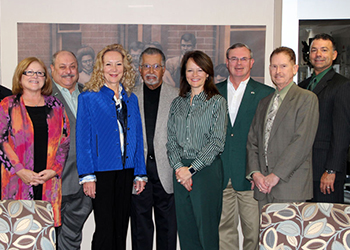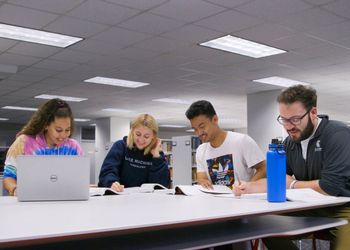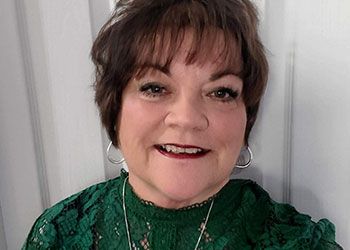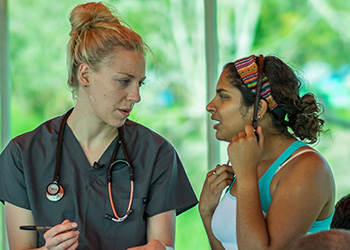Leading the Way
“I want to provide others with the chance to achieve their lifelong dreams and goals just as I had,” Robert Snyder ’79 said.
April 20, 2015
Seven outstanding alumni – very active in the day-to-day work of the college and exemplary donors – were invited to join Dean Strampel and other leaders to help shepherd this capital campaign for MSUCOM. They are:
Harold Friedman, 1980 alumnus, and clinical assistant professor of family and community medicine
Tressa Gardner, 1994 alumna and clinical assistant professor of osteopathic medical specialties (emergency medicine)
Glen Hatcher, 1975 alumnus and clinical professor of neurology and ophthalmology (ophthalmology)
Al Juocys, 1977 alumnus and clinical assistant professor of family and community medicine
David MacIntosh, 1976 alumnus and clinical associate professor of osteopathic medical specialties (internal medicine)
Robert Snyder, 1979 alumnus and clinical assistant professor of osteopathic surgical specialties (anesthesiology)
Mary Jo Voelpel, 1975 alumna and clinical associate professor of osteopathic medical specialties (hematology and oncology).
We took the time to ask this volunteer corps a few questions about the campaign, why they chose to be involved and what it will mean to the future of the college and the osteopathic medical profession.
Why did you accept the request to serve as a member of the MSUCOM Capital Campaign Volunteer Committee?
Snyder: I want to provide others with the chance to achieve their lifelong dreams and goals just as I had. I want to do everything I can to ensure the future of MSUCOM.
Hatcher: I considered it an honor to be part of this committee. I’m willing to do anything I can to make this college a success: going to lectures, Silverfest and Seminar in the Sun, being an ambassador for MSUCOM in the medical community in any way I can, and creating an endowment to help the students.
Voelpel: Alumni are needed to help create our legacy, and we need to embrace the changes of medicine and support them. I’ve created an endowment for students, the future of medicine. I believe that the stronger the college is, the stronger the profession will be.
Friedman: Everything I am and everything I’ve ever wanted to be is because of MSUCOM. My family’s comfort, the thousands of patients who’ve trusted their lives to me over the last 33 years — it’s all because of MSUCOM. It’s a labor of love to give back to the college that gave me everything I have. When Dean Strampel says, “Will you help me?” he doesn’t have to say anything else.
MacIntosh: I think we agreed to serve on the MSUCOM capital campaign out of a sense of duty. I enlisted in the Army in 1967 out of a sense of duty, I participated on many hospital committees out of sense of duty and we have that same sense of duty to university and the college.
We all hear that giving back is important. What was the biggest motivation that made you decide you had to make a gift to MSUCOM?
Snyder: There is a shortage of future physicians, and donating makes it easier for students to obtain their degrees.
Hatcher: Rather than giving back, I think of paying forward. Without our support for the college and its expansion, I think we increase the chances of being swallowed up as a profession. I hope the students I have helped will then continue to pay it forward.
Voelpel: I feel fortunate to have received the training I did, and my work has provided me with a rewarding lifestyle both professionally and personally. Because I have been given so much, I am obligated to give back.
Friedman: The MOA has an organization called the 49ers Club. Its concept is based on the idea of leaving the wood pile higher than you found it. Imagine you are in the woods in the dead of winter and you find a cabin with a note that says you can use it at no charge and only that you should leave the wood pile higher than you found it. The concept makes so much sense. The things we do today will make a big difference 10, 15, 20 years from now as things logarithmically change. When you see all the things the dean is doing in places like Mexico, Korea, Malawi and Canada — there are no other medical schools, let alone osteopathic schools — that have a presence that touches almost every continent. That word needs to get out when the best and brightest think about where to go — they see that MSUCOM is among the best and brightest.
MacIntosh: Giving back is important. I grew up in a humble environment; [I was ] the first in my family to pursue a college education. My undergraduate studies were financially difficult. Medical school was better because it was paid for by the GI Bill®. I see all medical students leaving with huge debt. I see our gifts supporting student scholarships.
If there was one thing that you could point to as the most important reason that someone should give to MSUCOM, what would it be?
Snyder: People here have been given a great opportunity. Physicians know they will always have a job. This profession has given us security, and we should give back. Student debt is so high these days, so alumni should step forward and assist. One way is to create a scholarship in memory of someone.
Hatcher: I’m proud and thankful I could go to MSUCOM and have the chance to give back. Our school has been in the top 10 for primary care education in the U.S. News & World Report for more than 10 years. I think we’re a flagship for D.O. schools. We were the first at a major university and we are truly a leader in medicine.
Voelpel: The medical profession is honorable and it should be supported. We need to have a strong voice. This can be aided if more physicians are outspoken and the college has more strength through donations.
Friedman: You can be a grassroots brick in the foundation of all of the new levels and new bridges and all of the new advances that the college is trying to make. You can be a part of that foundation. You don’t have to be the whole building. It’s not how many bricks you give; it’s that you are part of the fabric.
MacIntosh: MSUCOM has given us the opportunity to care for people, which is very satisfying, and the opportunity to live well.
When you think about the future of MSUCOM, what do you envision that the college will look like after the completion of a successful capital campaign?
Snyder: The move towards planning the new MSUCOM building will provide new and better technology for teaching future physicians, and we’ll be able to accept the best and the brightest because more people will have opportunity to come.
Hatcher: The students coming into the college now are unbelievable. I see it in my residents. It’s not just the board scores, but it’s the experiences they’ve had. For example, they’ve traveled to foreign countries; that’s the norm now, not the exception. We have expanded to the three sites. We’ll be around for a long time. This campaign will allow us to do so much more.
Voelpel: I believe MSUCOM is already strong. But I want to see it take on and match medical schools with great reputations, like the University of Michigan and Harvard. Financial support advances that vision.
Friedman: I think we’ll have a new physical plant that will be updated and state of the art in terms of the newest in educational capabilities; that will be the most visible goal that’s obtained. I think the real goal is to make sure that the projects that the dean has cast out internationally, that the campaign for fundraising is going to help bring fruition in that regard. It will validate U.S. osteopathic medicine around the world.
MacIntosh: I would hope it would remain the preeminent osteopathic college in the world, and of course, we would like to envision a new medical campus.
GI Bill® is a registered trademark of the U.S. Department of Veterans Affairs (VA). More information about education benefits offered by VA is available at the official U.S. government Web site at https://www.benefits.va.gov/gibill




